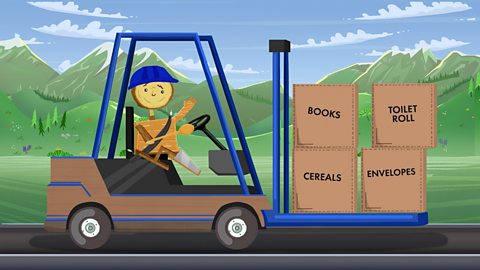Food and sustainability
Sustainable food choices can make a big difference to our local and global environment.
In this article you can learn about:
- What food miles are
- What seasonal eating means
- Why food waste is such a problem and how we can reduce it
- The benefits and challenges of making sustainable food choices
This resource is suitable for sustainability topics for primary school learners.
Video - Food and sustainability
In this video, learn about making sustainable food choices and how we can reduce food waste.
Fish fingers, potatoes and peas.
Mmm, tasty!
But have you ever wondered how food gets to our plates?
Yes, yes your dad makes it, but before that.
Fish fingers start their journey in the sea…
No, fish don’t actually have fingers.
Fishing boats catch fish in their nets. And they’re transported to a factory and made into fish fingers.
Meanwhile, potatoes and peas are grown on a farm.
Understanding where our food comes from is important, because the choices we make directly affect the environment.
Like eating seasonal food from local sources.
Different foods are harvested at different times of the year, like apples in Autumn, or strawberries in summer.
When food is grown locally like this, it doesn’t have to travel far to get to the shops.
But if you see apples in April, chances are they have travelled a long way to get to your supermarket.
They would have been brought over on container ships and lorries; burning fuel, making exhaust fumes and contributing to global heating!
So the more seasonally we eat, the better it is for the planet!
Another great way to help the planet is by reducing food waste.
4.5 million tonnes of food were wasted in the UK in 2019. That’s 900,000 shopping bags-full!
The more food we waste, the more fish we have to fish out of the sea, the more crops we have to grow and the more animals we have to raise for meat and dairy.
Which means we need more farmland, and wild places and animal populations around the world shrink.
And more farmland also means more fertilisers.
Chemical fertilisers can, in some cases, damage local environments and wildlife.
Don’t worry, though, you’re allowed to be full!
If you can’t finish your food right away, pop it in the fridge and finish it later for a snack.
Mmm, fish finger sandwiches.
Or put it in the food waste rather than the bin.
That way instead of just going to landfill, your leftover fish fingers are recycled and can even be used to generate electricity.
So remember, you can make a difference to our planet every day just by eating locally grown food, avoiding waste and using your food waste bin!
How to make a positive impact on the environment
Did you know that we make a positive impact on the environment through our food choices?
Here are some things we can do:
Reduce our food miles
Food miles describe how far food has travelled to get to you.
The further a piece of food has to travel to be eaten, the worse it is for the environment. This is because it will have to be transported by lorry, boat and/or plane, using fuels that harm the environment.
If we eat food that has been grown locally, it won't have travelled as far to get to us. This means it will have less of an impact on the environment.
Food miles. revision-guideFood miles
Find out more about food miles in this article
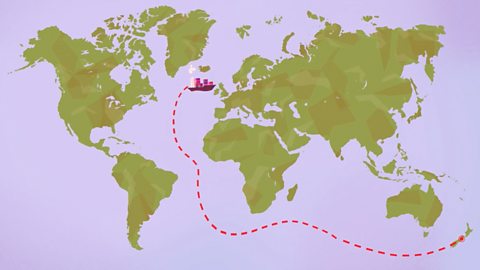
Eat seasonal foods
Seasonal foods are fruit and vegetables that are ripe and ready in a particular season.
For example, in Scotland we harvest strawberries in summer. If we want to eat fresh strawberries during winter time we need to import To bring in products or goods from another country. them from other countries or grow them in greenhouses that use heating and lighting powered by electricity.
Knowing when food is being grown locally can help us to eat a sustainable, local diet, reducing food miles and helping the environment.
Seasonal food. revision-guideSeasonal food
Find out more about seasonal food in this article
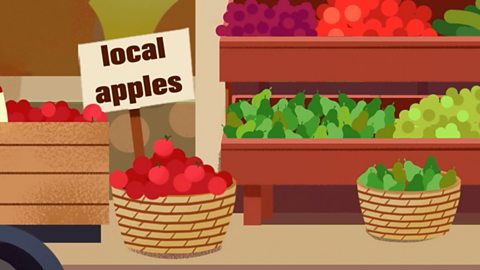
Plant-based foods
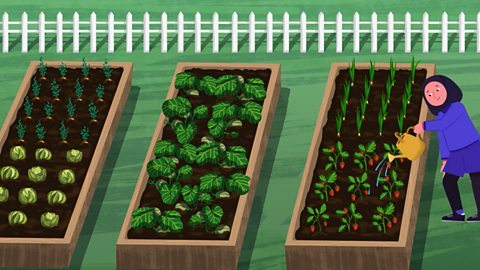
Plant-based foods are fruits, vegetables, beans, nuts, grains, seeds and even seaweed!
Growing plants for food needs land and energy but the plants get most of that energy from the sun.
Keeping animals for meat, eggs or dairy needs more energy. The animals get energy from food but just like us, a lot of that energy is used for movement and bodily functions. Much less of the energy goes towards food for people.
Another problem is that cows produce a lot of methane. This is a greenhouse gas that contributes to global warming.
Eating more plant-based foods can make our diet more sustainable.

Here are some things you can do:
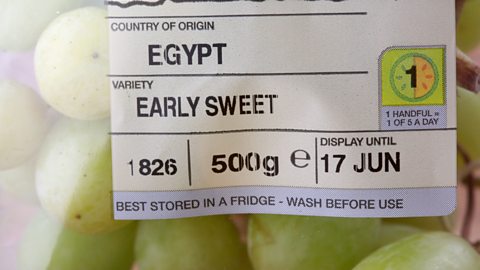
Image caption, Look at the packaging on your food to find out how far it has travelled to reach you
Some companies will grow food in one country, transport it to be packaged somewhere else, and then send it to you. Companies do this to save money but it adds a lot of food miles and is not sustainable. Looking out for this information can help you choose companies that produce food more sustainably. (Radharc Images / Alamy Stock Photo)
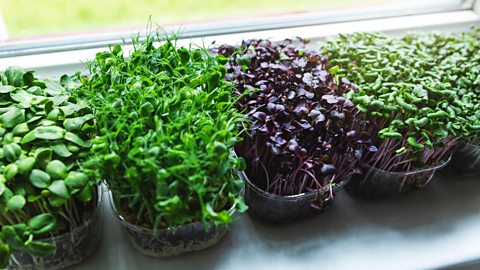
Image caption, Try growing some of your food
This way it doesn't need to travel far at all! (Panther Media GmbH / Alamy Stock Photo)
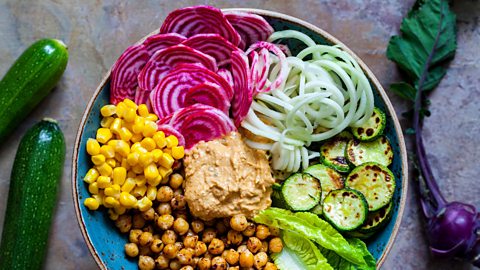
Image caption, Eat more plant-based food
Eating less meat and dairy and more plant-based foods can mean that our food is produced using less land and energy. (Magdalena Bujak / Alamy Stock Photo)
1 of 3
Reduce food waste
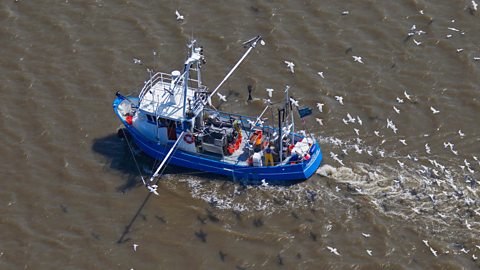
Around 4.5 million tonnes of food are wasted in the UK each year. That’s like 4.5 million cars in weight! Some of the waste is out of date food from shops and supermarkets, or leftover food from restaurants. We waste lots of food at home too.
This is a big problem for the human race because:
the more food we waste unnecessarily, the more fish, meat and plants we have taken out of their habitat for no reason.
we end up with fewer fish in the ocean, more chemical fertilisersSubstances that are sprayed on crops or put in the soil to help them and other food sources grow. They can be bad for the environment and our health. in the ground and more land and forests cleared to raise animals, all of which damages local wildlife and ecosystems.

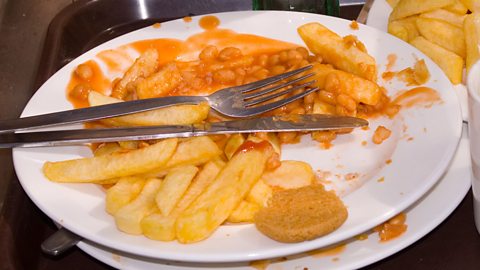
There is an ethicalRegarding questions of right or wrong and how one should behave. side to food waste as well.
We live in a country where most of us are lucky enough to have as much food as we like. Not everyone in the world is fortunate enough to have so much food available to them.
As a human race, we should be thinking more about how we can reduce our unnecessary food waste and distribute food more evenly around the world (and throughout our own country) so nobody is hungry.

Here are some things you can do to reduce food waste:
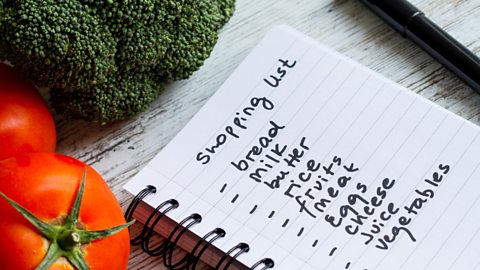
Image caption, Only buy as much food as you need
People often buy too much food and some ends up going to waste. Planning your meals and making a shopping list means you will only buy the ingredients you need. (Elizabeth Crego / Alamy Stock Photo)
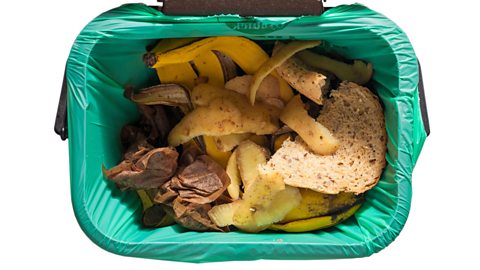
Image caption, Use the food waste bin for leftover food
Unwanted plant-based food can be used to make compost that can be used to help plants grow. Some industrial composters can break down meat and fish to feed plants too. Leftover food can also be used as biofuel to generate electricity. (Carolyn Jenkins / Alamy Stock Photo)
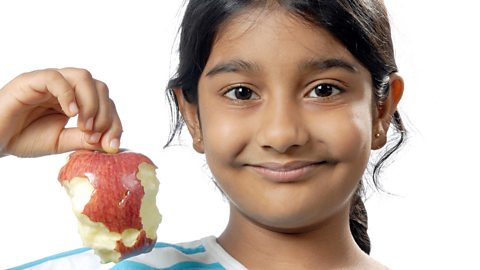
Image caption, Take any unfinished lunch back home
Let your adults see how much you eat each day, so you can talk about what you like and don't like. You can discuss how best to make sure you eat a healthy, balanced diet and cut down on wasted food. (Dinodia Photos / Alamy Stock Photo)
1 of 3
Remember!
Although we can compost food in food waste bins, it has still been produced, so has already impacted on the environment.
The best thing we can do is reduce the amount of food we waste.
Food waste. revision-guideFood waste
Find out more about food waste in this article
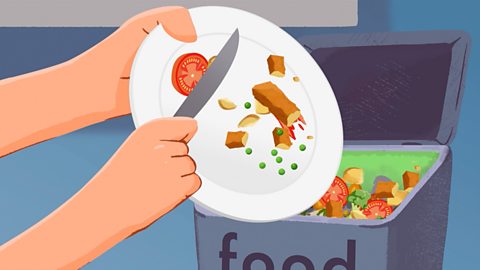
Benefits and challenges of reducing food waste
Benefits of reducing food waste
By using sustainable food practices like reducing the amount of food we waste and making good decisions about the food we eat, we can preserve the world's food supplies and lessen our impact on the environment.
By reducing food waste and planning your shopping, you can save money. The less food you buy and waste, the less money you spend.
Composted food can be used to grow more food, or even generate electricity. Learn more about using food waste to make fuel or generate electricity here: Biomass energy
Challenges of reducing food waste
People might not know how to plan meals for a shopping list.
People might be too busy to think about and plan the food they buy. Sometimes this can lead to buying too much and the food then goes to waste because it is past its sell by date.
Composting and a lot of other recycling methods take time and space, which some people don't have. Others might not know how to get started.

Key words about food waste
Sorry, something went wrongCheck your connection, refresh the page and try again. – Doing something that will cause little or no damage to the environment and will be able to continue for a long period of time.
Sorry, something went wrongCheck your connection, refresh the page and try again. - The distance food travels from the country in which it is grown to where it is bought or eaten by the customer. The more food miles that food requires, the less sustainable and the less environmentally friendly it is.
Sorry, something went wrongCheck your connection, refresh the page and try again. – To eat foods that are grown locally and harvested during the current season. For example, eating Scottish strawberries in the summer and not at any other time.
Sorry, something went wrongCheck your connection, refresh the page and try again. – Substances that are sprayed on crops or put in the soil to help them and other food sources grow. Chemical fertilisers can be bad for the environment and our health, which is why some people choose to eat organic food (food that is grown without the use of chemical fertilisers).
Test your knowledge
Quiz
Challenge

Identify the main source of your food waste.
Is it uneaten food on your plate or food beyond its sell by date?
Weigh how much food waste your household produces throughout a week.
Ask if you can help with the food shopping the following week to help reduce the amount of food your household is wasting.
Weigh the food waste at the end of the second week to see if you were able to reduce the amount of food wasted.
(Remember to compost food waste if you can!)
(As an extra challenge, look at the packaging of the food your household buys. Make a note of where the food is grown and packaged. Can you find something grown locally and in season and something that has been import To bring in products or goods from another country.? See if you can find the locations and countries on a map.)
More on Sustainability
Find out more by working through a topic
- count6 of 28
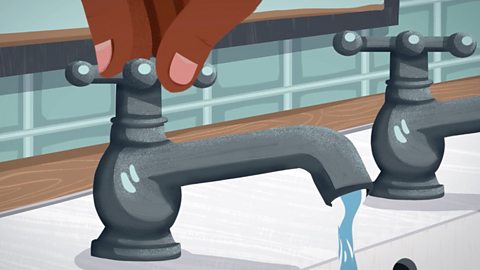
- count7 of 28
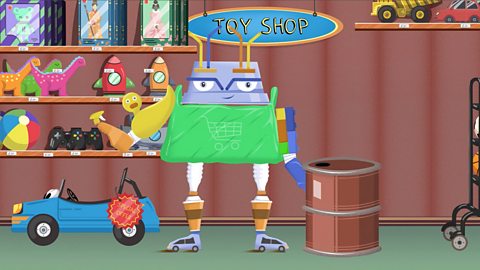
- count8 of 28
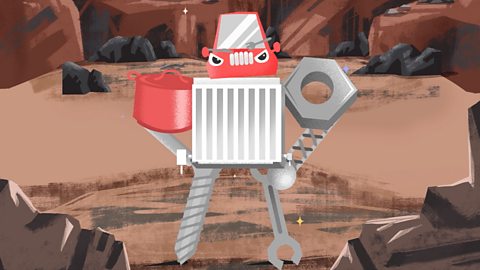
- count9 of 28
